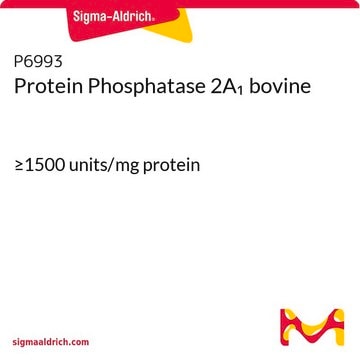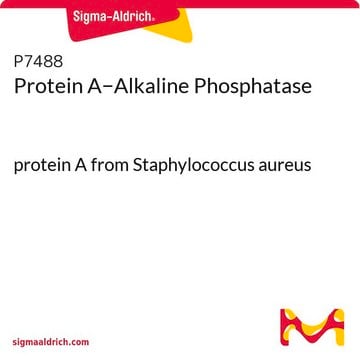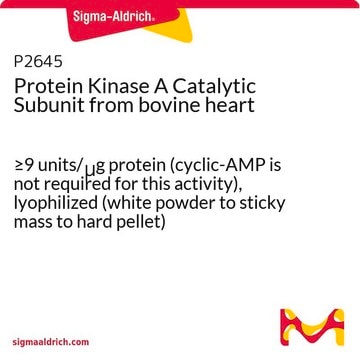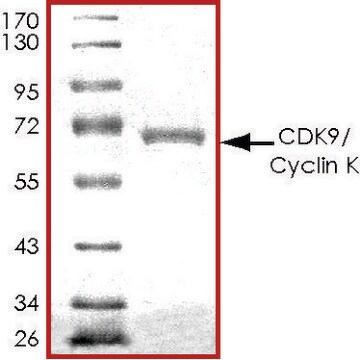P7937
Protein Phosphatase-1 Catalytic Subunit, α-Isoform from rabbit
5,000-15,000 units/mg protein, recombinant, expressed in E. coli, lyophilized powder
Synonym(s):
Protein phosphatase
Sign Into View Organizational & Contract Pricing
All Photos(1)
About This Item
MDL number:
UNSPSC Code:
12352202
NACRES:
NA.32
Recommended Products
biological source
rabbit
Quality Level
recombinant
expressed in E. coli
Assay
≥80% (GE)
form
lyophilized powder
specific activity
5,000-15,000 units/mg protein
mol wt
37.5 kDa
technique(s)
inhibition assay: suitable
UniProt accession no.
storage temp.
−20°C
Gene Information
rabbit ... PPP1CA(100009298)
General description
Protein phosphatase1 (PP1) is a heterodimeric enzyme with serine/threonine phosphatase activity. It comprises a catalytic subunit and a targeting subunit or a specific protein inhibitor. The targeting subunit determines the enzyme localization, e.g., to glycogen particles (subunit G) or to myofibrils (subunit M).
Application
Protein Phosphatase-1 Catalytic Subunit, α-Isoform from rabbit has been used as a standard in protein phosphatase-1 inhibition assay.
Protein Phosphatase-1 Catalytic Subunit, α-Isoform from rabbit has been used in protein phosphatase reaction and in the digestion of adipocyte extracts.
Biochem/physiol Actions
Protein phosphatase1 (PP1) is involved in glycogen metabolism and in regulation of muscle contractility. In addition, it is implicated in cell cycle and transcriptional regulation. Recombinant rabbit PP1α has properties in common with the native rabbit muscle protein including size, requirement for Mn2+ for activity, specificity for phosphorylase A, and inhibition by okadaic acid, microcystin LR, and phosphatase inhibitor2 (I-2).
Packaging
Package size based on protein content.
Unit Definition
One unit will hydrolyze 1 nmole of p-nitrophenyl phosphate per min at pH 7.4 at 30 °C.
Physical form
Lyophilized powder containing imidazole buffer, pH 7.4, NaCl, DTT, EDTA, MnCl2, Tween 20, and trehalose as stabilizer.
inhibitor
Product No.
Description
Pricing
Storage Class Code
11 - Combustible Solids
WGK
WGK 3
Flash Point(F)
Not applicable
Flash Point(C)
Not applicable
Personal Protective Equipment
dust mask type N95 (US), Eyeshields, Gloves
Certificates of Analysis (COA)
Search for Certificates of Analysis (COA) by entering the products Lot/Batch Number. Lot and Batch Numbers can be found on a product’s label following the words ‘Lot’ or ‘Batch’.
Already Own This Product?
Find documentation for the products that you have recently purchased in the Document Library.
Customers Also Viewed
Shota Takabatake et al.
Biochemical and biophysical research communications (2020-02-23)
Ca2+/calmodulin-dependent protein kinase kinase β (CaMKKβ) acts as a regulatory kinase that phosphorylates and activates multiple downstream kinases including CaMKI, CaMKIV, 5'AMP-activated protein kinase (AMPK) and protein kinase B (PKB), resulting in regulation of wide variety of Ca2+-dependent physiological responses
Serine/threonine phosphatases: mechanism through structure.
Shi Y
Cell, 139(3), 468-484 (2009)
Activity of membrane-associated sucrose synthase is regulated
by its phosphorylation status in cultured cells of sycamore (Acer
pseudoplatanus)
by its phosphorylation status in cultured cells of sycamore (Acer
pseudoplatanus)
Javier P
Physiologia Plantarum (2004)
Regulation of protein phosphatase-1
James B Aggen
Chemistry and Biology, 7.1, R13-R23 (2000)
M C Faux et al.
Trends in biochemical sciences, 21(8), 312-315 (1996-08-01)
One important regulatory mechanism in the control of phosphorylation events is the subcellular location of phosphatases of kinases. Several serine/threonine phosphatases and kinases have now been shown to be associated with targeting subunits; these contribute to the organization and specificity
Our team of scientists has experience in all areas of research including Life Science, Material Science, Chemical Synthesis, Chromatography, Analytical and many others.
Contact Technical Service








